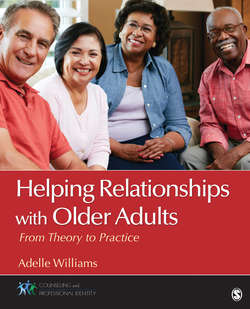Читать книгу Helping Relationships With Older Adults - Adelle M. Williams - Страница 28
На сайте Литреса книга снята с продажи.
Hearing
ОглавлениеConductive and sensory hearing losses occur with age. Individuals with hearing loss may be unable to hear higher tones, making consonants in speech difficult to differentiate. Other consequences of hearing loss include difficulty in localizing sound and understanding speech, usually accompanied by hypersensitivity to loudness. Common conditions in old age (ruptured eardrum, wax buildup, infection) are superimposed upon these changes, often resulting in worsening hearing impairment (Besdine & Wu, 2008).
Hearing loss can create a psychological solitary confinement, yet many older adults with hearing loss deny the disability or the impact it exerts on their quality of life. A practitioner working with older adults experiencing hearing loss may need to ascertain the individual’s stage of acceptance. Family members who attribute hearing loss as mild or moderate inadvertently bolster the individual’s denial (Dewane, 2010).
Older adults who are hard of hearing often report that when their hearing loss causes communication problems, it can result in difficulty thinking or concentrating. This results in inattentiveness, distraction, and boredom. The most serious consequence is withdrawal or abandoning participation in conversations. Older adults with hearing loss face many of the same fears that anyone with a disability encounters: They worry about loss of significant relationships or jobs or about being perceived as incompetent. Communication breakdown problems may show up in physical symptoms such as tension, exhaustion, and psychological symptoms (Dewane, 2010).
Sometimes hearing loss exerts a direct impact on mental health. Depression and adjustment disorder can occur as a natural response to hearing loss and its subsequent impact on the quality of life. On the other hand, some people have premorbid mental health issues and hearing loss simply compounds the problem. Inability to hear and discern messages and their meaning can result in feelings of shame, humiliation, and inadequacy. It can be highly embarrassing to be unable to behave according to applicable social rules. The feeling of shame linked to hearing loss stems from older adults inadvertently reacting in inappropriate and socially unacceptable ways, such as responding to a misunderstood question in an inaccurate fashion (Dewane, 2010).
Most changes in hearing are likely due as much to noise exposure as to aging. Exposure to loud noise over time damages the ear’s ability to hear. Nonetheless, some changes in hearing occur as people age, regardless of their exposure to loud noise. As people age, hearing high-pitched sounds becomes more difficult. This change is considered age-associated hearing loss (presbycusis). For example, violin music may sound less bright. The most frustrating consequence of presbycusis is that words become harder to understand. As a result, older people may think that other people are mumbling. Individuals need to articulate consonants more clearly, rather than speak louder. Many older people have more trouble hearing in loud places or in groups because of the background noise. Also, earwax, which interferes with hearing, tends to accumulate more (Porter, 2009; Talbot & Hogstel, 2001). Changes in the ability to hear impacts older adults in many ways, and the change in taste also interferes with personal well-being.
